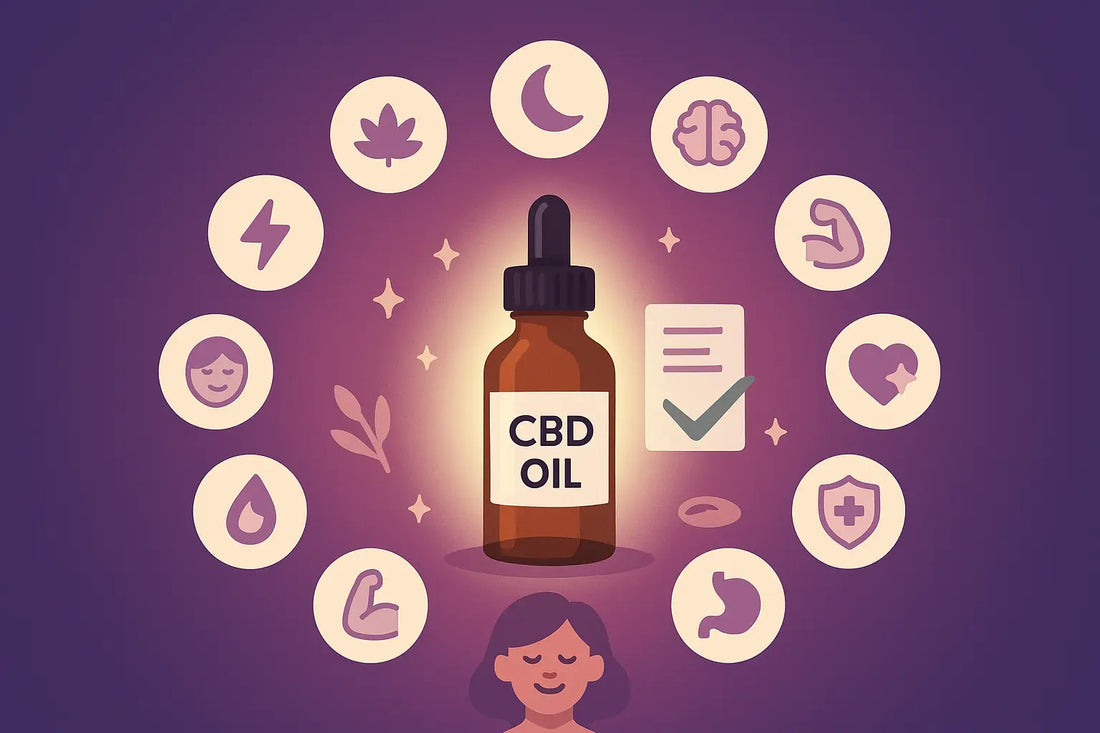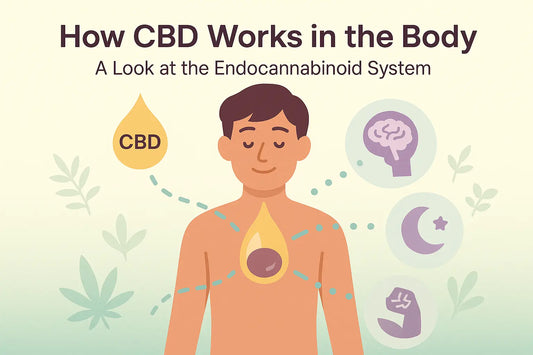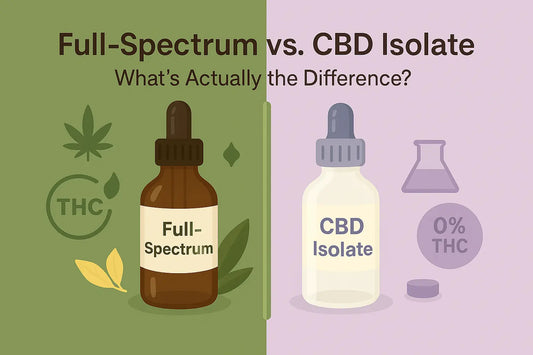
10 Powerful Benefits of CBD You Should Know About
Cenk CetinShare
Introduction
CBD, an abbreviation for cannabidiol, is a non-intoxicated compound derived from the cannabis plants. It has gained significant attention in recent years for its wide range of therapeutic benefits. From easing chronic pain and reducing anxiety to improving sleep and promoting overall well-being, CBD is transforming the way we approach natural remedies. Exploring the 10 key benefits of CBD through this article and shed light on how it supports health and wellness in today’s fast-paced world. Whether you’re new to CBD or looking to deepen your knowledge, these insights can help you understand why it’s becoming a trusted ally in holistic health.
Key Takeaways
- CBD is a compound found in cannabis that is non-intoxicated and packs with therapeutic benefits.
- It is primarily known to help relieve pain and inflammation.
- CBD promotes relaxation and reduces stress, as well as helps manage anxiety and depression.
- It may help improve sleep quality by alleviating underlying pain or stress.
- It showed promise in reducing seizures, easing migraines, and managing chemotherapy side effects.
- Interestingly, CBD supports digestive health and heart health.
- CBD may help in managing substance use disorders.
1. Relieve Pain and Inflammation
CBD holds the potential to alleviate chronic pain, which is attributed to its anti-inflammatory properties. It is believed to modulate the body’s endocannabinoid system (ECS), the system that plays a role in regulating various physiological processes. CBD interacts with several different receptors in the body, and by influencing the ECS, CBD may offer the alleviation of pain and inflammation. As stated in the 2022 systematic review, researchers promised that CBD could help reduce pain and inflammation in conditions like arthritis and multiple sclerosis.
2. Relaxation and Stress Relief
CBD is known for its relaxation and alleviating stress by interacting with the endocannabinoid system—a key neural network involved in regulating cognitive and physiological functions. Research has highlighted several stress-related benefits of CBD oil. CBD has also demonstrated its ability to improve physiological markers of acute stress such as heart rate variability (HRV) which measures how the body responds to stress. Interestingly, participants who believed CBD could help alleviate their stress experienced even greater changes in HRV, suggesting a potential placebo effect alongside its biological impact. Through these findings, CBD continues to show promise as a natural alternative for managing stress and delivering relaxation.
3. Reduce Depression and Anxiety
Many studies spanning decades on CBD have shown promise in reducing symptoms of anxiety and depression. For anxiety, multiple animal studies have demonstrated its ability to ease anxiety-like behaviors, and several human studies support these findings. Early research from the 1970s and 1980s found that CBD reduced THC-induced anxiety. In more recent studies, CBD has been shown to alleviate anxiety during public speaking tests and reduce symptoms in people with social anxiety disorders.
Teenagers with social anxiety and individuals whose anxiety medications were ineffective reported improvements when using CBD in studies published between 2019 and 2022. With more than a dozen ongoing trials, CBD’s potential to address anxiety disorders and related conditions is actively being explored.
CBD may also benefit individuals struggling with depression, although studies are more limited. Animal research suggests CBD has antidepressant properties, and some human studies have found similar results. For example, a 2012 study involving people with cancer and chronic pain showed that a drug containing CBD and THC improved depressive symptoms. Additionally, surveys and clinical trials have highlighted the potential for CBD to alleviate depression in various contexts, including cannabis-induced depression and chronic pain management.
While researchers are still uncovering how CBD works, it is believed to interact with more than 65 brain receptors, some of which influence serotonin—a neurotransmitter that regulates mood. This mechanism could explain why CBD might help manage anxiety and depression, similar to existing medications that target serotonin. However, the full scope of its effects involves other receptors and pathways, making it a fascinating area for further investigation.
4. Improve Sleep Quality
It is a bit tricky here, while some clinical studies have shown that CBD alone does help improve sleep quality, however, the participants in these studies also had other health problems such as chronic pain, or multiple sclerosis. Therefore, the result is not clear if CBD helped with sleep directly—or if it helped as it eased symptoms of other conditions, like anxiety or pain. On the other hand, when CBD alone has been studied in a healthy group of people with no other health issues, the results are mixed. While it is not clear why these studies showed different results, it might be due to the different doses the individual has taken.
How might CBD work for sleep? Here’s the possibility—CBD might affect our sleep through the interaction of the endocannabinoid system (ECS)’s receptors that are involved in a part of your brain called the “hypothalamus”, which helps you fall asleep and wake up.
5. Seizures Reduction
CBD can help prevent certain types of seizures in some people and animals. The endocannabinoid system plays another big role in these bodily functions when interacting with cannabinoids like CBD. However, a board-certified pediatrician at Providence Saint John’s Health Center in Santa Monica Dr. Daniel Ganjian believes that CBD may interact with the brain systems involved in regulating seizures and potentially reducing the frequency and severity. Currently, there is the first and only FDA-approved CBD-infused medication known as “Epidolex” for seizures caused by Lennox-Gastaut, Dravet syndrome, and tuberous sclerosis complex.
6. Headache and Migraine Relief
Good news for those who tend to suffer from migraine and headaches, the American Migraine Foundation has reported the promising efficacy of CBD extract oil as a treatment for migraine. However, some studies may suggest that CBD might be an effective way to ease chronic pain as well as reduce headache frequency and severity, more research is needed. Still, the Food and Drug Administration (FDA) has not yet approved CBD use as a way to relieve any pain including migraine due to the lack of evidence that CBD is a safe or effective migraine treatment. Here is what we know so far, according to many researchers:
-
A 2016 study found that medical cannabis might help lower the frequency of migraine headaches, although the research did not specifically examine the effects of CBD.
- Another study conducted in 2018 also found that cannabis seems to offer promising relief from pain, including migraine-related pain.
Further research is required to confirm CBD's safety and effectiveness in treating migraine headaches, including determining the optimal dosages and formulations.
7. Ease Cancer Treatment Side Effects
Known for its potential to alleviate some of the chemotherapy's side effects such as nausea, fatigue, and nerve pain, CBD has gained more attention among both healthcare professionals and cancer patients. However, using CBD during chemotherapy requires careful consideration and professional guidance from the healthcare provider. Chemotherapy works by targeting fast-growing cancer cells but it can also harm other healthy cells which leads to unpleasant, debilitating side effects. CBD may offer relief, however, it could also interfere with the way your body processes chemotherapy drugs, potentially increasing drug levels and side effects. Research on CBD and chemotherapy interactions is still ongoing, and some studies suggest that CBD may affect the efficacy of your treatment. So, consulting with the oncologist before taking CBD with chemotherapy is strongly advised.
8. Improve Digestive Health
Most people may have heard that CBD is a natural treatment for pain relief and stress management. What people didn’t know about is its interactions with the digestive system. Here’s how CBD may positively impact the digestive system:
-
Decreasing Inflammation: Digestive issues often stem from inflammation, which can disrupt gut health which can lead to various diseases. Research suggests CBD may help reduce inflammation by interacting with the body’s endocannabinoid system and offer relief with minimal side effects. Incorporating CBD-infused oil with an anti-inflammatory diet may help improve gut health and overall well-being.
-
Regulating Appetite: Poor digestion often leads to bloating, which can be triggered by overreacting or irregular meal times. CBD may help regulate appetite by addressing nausea, calming an overactive nervous system, and reducing stomach discomfort. Interestingly, CBD seems to have a dual effect—it can increase appetite for those who struggle to eat and may reduce it for individuals prone to overeating.
- Lowering Stress: Stress can directly affect digestive health and often lead to symptoms like loose bowel movements or nutrient absorption issues. CBD may help reduce stress through the interaction with receptors in the nervous system to lower heart rate and blood pressure and promote a sense of calm.
By working through the endocannabinoid system and potentially influencing serotonin response, CBD can help regulate mood, energy, and stress levels—all of which contribute to better digestion. While more research is needed, CBD offers a promising natural option for improving gut health and overall digestive function.
9. Improve Heart Health
Another exciting benefit of CBD is its potential to support heart health, particularly through its anti-inflammatory and protective properties. Inflammation plays a significant role in many heart-related conditions, including coronary heart disease, high blood pressure, and stroke. Early research has shown that CBD may help reduce inflammation and offer protective benefits to the heart. Studies conducted on animals such as rats and mice show that CBD could protect the heart after a heart attack or alleviate heart damage associated with diabetes. Researchers are also exploring the use of pure CBD as a treatment for specific heart and circulatory diseases, including myocarditis and cardiomyopathy. However, these findings are still preliminary, and much of the research is in its early stages or limited to animal studies.
While the potential is promising, more extensive human studies are needed to confirm the effectiveness of CBD for heart health. If you’re considering using CBD as part of your heart health regimen, consult with your doctor to ensure it complements your existing treatments safely.
10. Substance Use Disorders
CBD shows potential in helping individuals manage substance use disorders by possibly reducing cravings for alcohol, opioids, and stimulants. It may also help alleviate withdrawal symptoms associated with opioids, offering a natural option for support during recovery. However, managing substance use disorders is complex and requires professional guidance. Even though CBD can be beneficial, it is important to consult with the healthcare provider before incorporating CBD into the treatment plan—as they can recommend the most effective approach to each individual's needs and ensure that CBD is used safely and appropriately as part of the recovery journey.
Wrap Up
CBD, or cannabidiol, is a non-intoxicating compound from cannabis plants that offers numerous therapeutic benefits. It may help relieve pain and inflammation by interacting with the body’s endocrine system, while also promoting relaxation and reducing stress. Studies suggest CBD can alleviate symptoms of anxiety and depression, potentially through its impact on serotonin levels. It may also improve sleep by addressing underlying issues like pain or stress. CBD has shown promise in reducing seizures, easing migraines, and managing side effects of cancer treatments, such as nausea and fatigue. Additionally, it is known to support gut health by reducing inflammation, regulating appetite, and reducing stress. CBD may also assist in managing substance use disorders by reducing cravings and withdrawal symptoms. Consulting a healthcare professional before incorporating it within the routine is essential for safe and effective use.








